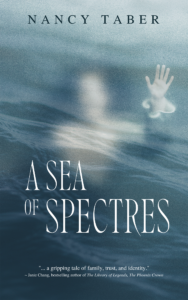Launch: Nancy Taber’s A Sea of Spectres
INTERVIEW BY LESLIE S. LOWE
Nancy Taber is a former military officer who served as a Sea King helicopter Tactical Coordinator and is currently a university professor. She has published articles, chapters, and short stories about the intersection of gender, war, and militarism in many journals and edited books. Her debut novel, A Sea of Spectres, is published with Acorn Press.
How would you describe this book and its themes?
On the choppy coastline of Prince Edward Island, an ocean-phobic detective evades the deadly lure of a phantom ship by delving into her family’s history and harnessing her matrilineal powers of premonition. When she starts pulling the threads of a missing-person case, she discovers how uncanny abilities have impacted her ancestral line: Madeleine’s abilities tried to keep her family safe during the Acadian Expulsion in 1758; Celeste’s tempted her to take back what was rightfully hers in 1864. And now it’s Raina’s turn. Is she strong enough to carry her family’s legacy? Or will that legacy carry her—out into the burning sea of spectres?
 What inspires you about history and what has been the most rewarding about writing it?
What inspires you about history and what has been the most rewarding about writing it?
Learning about women forgotten by history and imagining their lives is endlessly fascinating to me. My story ideas are almost always sparked by a historical fact about a woman who lived decades or centuries ago. If I say to myself, “you’ve got to be kidding me, I can’t believe this is true,” then I have a premise worth pursuing. I’m also intrigued by folklore and myth, in that the mystical is often hiding just under the surface of everyday life.
Where did you get the idea of a character who delves into family history and harnesses matrilineal premonition? Have you researched your family history and does your matrilineal line hold special traits such as premonition?
The idea began when my mother sent me an article that mentioned my ancestor Madeleine’s experiences journeying from Prince Edward Island (PEI) to Saint-Malo, France, in 1758. Then I won a copy of an 1864 PEI almanac, which included an entry about bank cleaners accused of stealing currency, inspiring Celeste. The character of Raina, a police detective, is a compilation of my research about women in (para)military contexts, situated in the contemporary context of small-town PEI life. In the novel, Madeleine, Celeste, and Raina are related, but Madeleine is the only character from my own matrilineal line. As far as I know, my actual matrilineal line unfortunately has no powers of premonition so, to bring in the speculative elements, I asked myself, if Acadian folklore were true and the phantom ship were real, how might that have affected my characters?
Why the focus on this topic now? Is there a key historical event you found in researching that inspired you to write this story to portray a message for now?
My fiction demonstrates how the lives of women are connected through the past, across contemporary times, and into the future. In every time period, there have always been diverse women who rebelled against societal restrictions and roles. Their stories are the ones I want to tell, to draw attention to their courage and how their actions have contributed to the gains of women today, which contribute to those in the future. Despite often facing backlash and backsliding, women continue to fight for equity.
How do the time periods differ or connect in how the characters transform throughout the story? What did their journeys mean to you as you wrote it?
In each time period, as the characters learn about their abilities and the importance of their matrilineal line, they’re forced to make decisions that greatly affect family relationships. Though the time periods differ greatly with respect to technology, travel, communication, and women’s roles, they are also connected through each character’s ancestral abilities and the struggles they face in choosing how to best protect their families. When writing about their emotional journeys and character arcs, I was drawn to each character for different reasons: Raina, a police detective, works in a male-dominated profession, as I did in the military; Celeste, a young woman in a new city, strives to gain her independence, as I did in my late teens; Madeleine, a mother, focuses on her children while juggling everything the world throws at her, as I have experienced, though in much less dire circumstances. Each character, though entirely fictionalized, has a tiny piece of me inside them.
How do you think the reader will connect with Raina, Madeleine, and Celeste in this story?
I think readers will put themselves into the positions of Raina, Madeleine, and Celeste to ask themselves, “What decision would I make…” in relation to dealing with the phantom ship, learning about premonitions, negotiating family ties, struggling to survive in a new city, and being forced to leave your home. While readers’ specific experiences are likely to differ from those of my characters, the themes of ancestral ties, familial kinship, and community belonging will resonate with them.
How did you balance the research with writing the story? Did you get to do any interesting interviews for your research about the time periods in the story?
I first read widely about the context where (and when) my story took place. I dove into academic books and journal articles about the Acadian Expulsion, PEI history, and Acadian folklore, particularly with respect to the lives of women. The best part about the research was touring heritage sites and museums with my mother, on PEI as well as Saint-Malo. I used the research as a basis for the story and then let the characters take over.
What are you working on now? Is it connected to this story in any way?
I’m working on a few different novels at various stages of completion. They’re thematically connected to A Sea of Spectres in that they focus on complex women characters who resist the norms of their time, in historically grounded contexts, and include fantastical elements based on folklore.
How has your military life and work experiences been incorporated with or assisted you in your writing?
My background as a military officer and my research about women in the Canadian military assisted me in writing A Sea of Spectres. Uniforms, ranks, regulations, standard operating procedures, and training are quite familiar to me. Moreover, I could understand and imagine how Raina navigated her police work and the men with whom she interacted. Other elements of military and paramilitary contexts come into the novel, in both Madeleine’s and Celeste’s timelines, as they each negotiate life in times of war and criminal accusations.
 Every author has their own publishing journey. Tell me about yours.
Every author has their own publishing journey. Tell me about yours.
My publishing journey for A Sea of Spectres has been a rollercoaster, from inspiration, to researching, drafting, joining writing groups, learning from craft workshops, editing, putting the novel in a proverbial drawer for a few years, re-writing, querying agents, signing with my agent, submitting my novel to publishers, and signing with Acorn Press, with revisions everywhere in between. Acorn Press, a small press on PEI, is the perfect home for A Sea of Spectres and I’m so pleased to be publishing with them.
What advice would you give to other aspiring historical writers?
Let history inspire you but don’t be afraid to shape the narrative as needed for your novel. Once you’ve completed the research to understand your setting, time periods, and characters, alter minor elements as needed to suit your story. The Author’s Notes are the perfect place to tell readers what you changed and why. If you’re taking significant liberties with established history, consider positioning your novel as alternative history.
What is the last great book you read? Why?
This is such a tough question, if I can only pick one. I’ll have to choose Rose Sutherland’s A Sweet Sting of Salt, for its engaging story, complicated women characters, rural 19th century Nova Scotian setting, and twist on maritime folklore.






